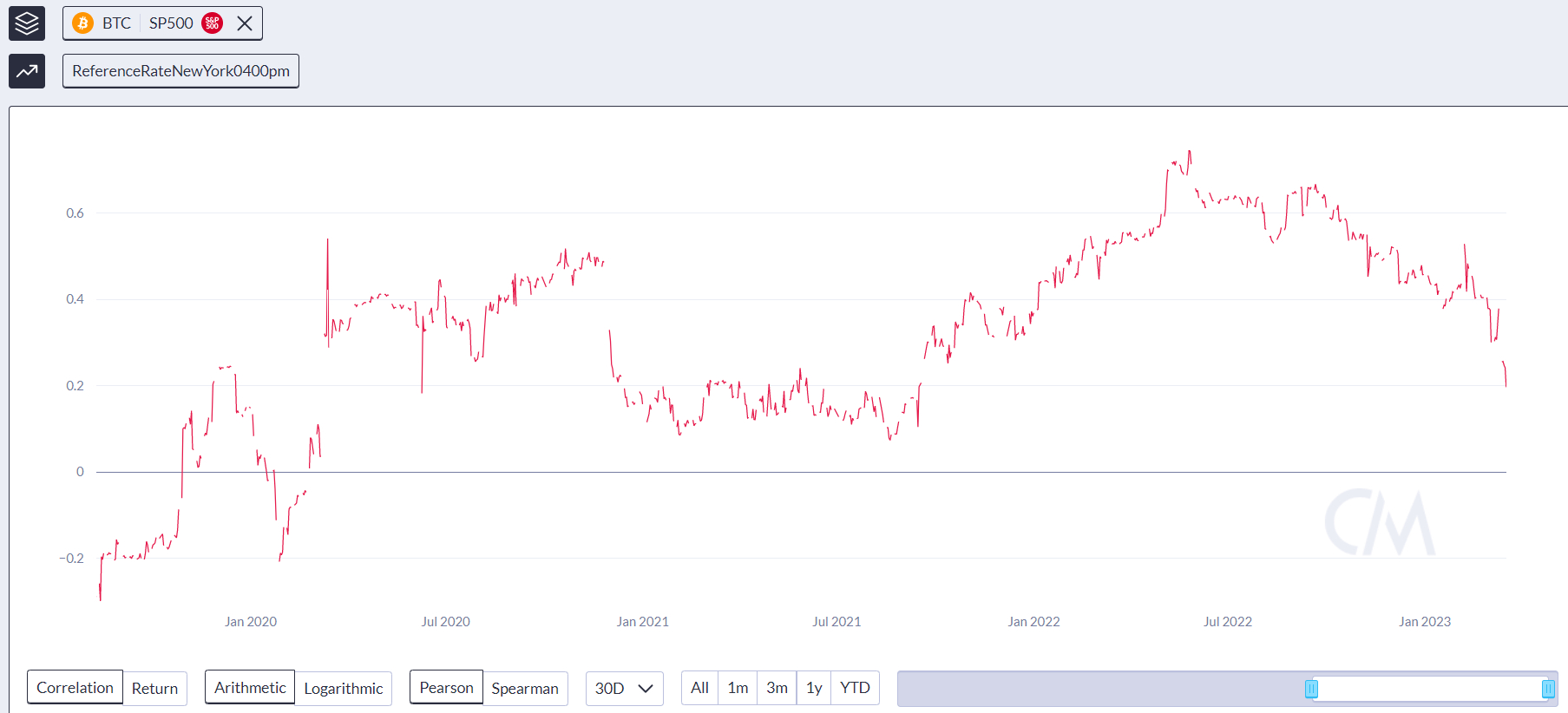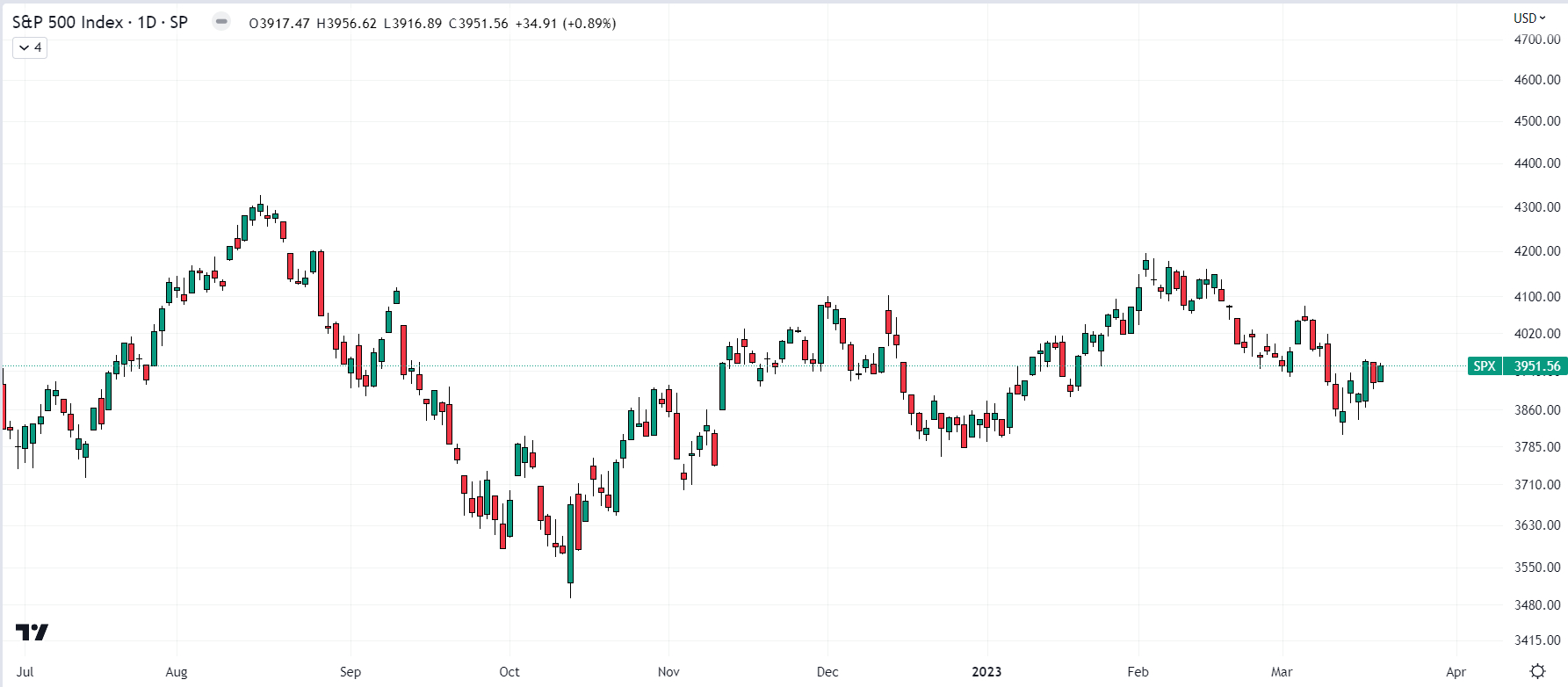Bitcoin’s correlation to US equity markets just fell to its lowest level in more than a year and a half. That’s according to crypto analytics firm CoinMetrics, who present a chart showing that Bitcoin’s 30-day pearson correlation between Bitcoin and the S&P 500 just fell under 0.20, its lowest level since September 2021.

That’s a big reversal from mid-2022, when Bitcoin and stocks were largely moving in lockstep and the 30-day correlation briefly surpassed 0.7.
And given the divergence in the Bitcoin price (which has been surging) and the S&P 500 (which has been languishing) in the past two weeks, that correlation will likely continue to drop.
If it falls under 0.08, it would hit a three-year low.
Why is Bitcoin’s Correlation to Stocks Breaking Down?
In 2021 and 2022, Bitcoin was largely viewed as a speculative technology/asset that ought to trade according to liquidity conditions, much like a tech stock.
That largely explains why the cryptocurrency saw such a big pump in 2020 and 2021 as the US (and global) economy was loaded with fiscal and monetary stimulus, before then pulling back aggressively in 2022 as that stimulus was pulled back on (primarily via aggressive rate hikes from major central banks).
Bitcoin’s pump of 2020/21 and dump of 2022 meant its price moved largely in tandem with that of the US tech stock sector.
But the bubblings of a financial crisis in early 2023 is putting that relationship to the test.
Rather than viewing Bitcoin as a speculative asset (like a tech stock), investors might finally be starting to view Bitcoin how its creators and proponents have wanted them to view it all along – as a safe-haven alternative to the fiat-based central bank-centered fractional reserve banking system.
The last few weeks have seen Bitcoin stake a decent claim to the title of “digital gold”.
Bitcoin is up over 40% from earlier monthly lows under $20,000 as investors look for alternative, “harder” currencies/mediums of exchange, with the cryptocurrency rallying in tandem with gold prices.

Fiat currencies (like the US dollar, Euro and British pound) aren’t deemed as hard as gold and Bitcoin as their value can more easily be eroded via inflation.
Bitcoin has thus been catching a safe haven bid just as US stocks have been languishing, with investors fretting amid uncertainty over how bad the current troubles in the bank sector are going to get, and how much this will impact the outlook for economic growth.

Here’s Why BTC’s Falling Correlation to Stocks is Bullish
Bitcoin isn’t just some speculative technology that will probably soon go away.
It’s a highly robust, incorruptible, decentralized peer-to-peer payments system that offers a real, fairer and transparent alternative to the existing financial system.
And investors finally appear to be treating it as such, a bullish sign for the cryptocurrency.
If the banking crisis worsens and stocks fall as a result, this is likely to further spur safe-haven gains in Bitcoin.
Meanwhile, even if US authorities do manage to stave off a crisis, the outlook for significant further tightening from the US Federal Reserve has likely taken a fatal blow.
In other words, the end of the hiking cycle appears is most likely well within touching distance.
And if easier financial conditions are ahead (meaning lowers US yields) that should bode well for both gold and Bitcoin.
Bitcoin’s correlation to US equity markets just fell to its lowest level in more than a year and a half. That’s according to crypto analytics firm CoinMetrics, who present a chart showing that Bitcoin’s 30-day pearson correlation between Bitcoin and the S&P 500 just fell under 0.20, its lowest level since September 2021.

That’s a big reversal from mid-2022, when Bitcoin and stocks were largely moving in lockstep and the 30-day correlation briefly surpassed 0.7.
And given the divergence in the Bitcoin price (which has been surging) and the S&P 500 (which has been languishing) in the past two weeks, that correlation will likely continue to drop.
If it falls under 0.08, it would hit a three-year low.
Why is Bitcoin’s Correlation to Stocks Breaking Down?
In 2021 and 2022, Bitcoin was largely viewed as a speculative technology/asset that ought to trade according to liquidity conditions, much like a tech stock.
That largely explains why the cryptocurrency saw such a big pump in 2020 and 2021 as the US (and global) economy was loaded with fiscal and monetary stimulus, before then pulling back aggressively in 2022 as that stimulus was pulled back on (primarily via aggressive rate hikes from major central banks).
Bitcoin’s pump of 2020/21 and dump of 2022 meant its price moved largely in tandem with that of the US tech stock sector.
But the bubblings of a financial crisis in early 2023 is putting that relationship to the test.
Rather than viewing Bitcoin as a speculative asset (like a tech stock), investors might finally be starting to view Bitcoin how its creators and proponents have wanted them to view it all along – as a safe-haven alternative to the fiat-based central bank-centered fractional reserve banking system.
The last few weeks have seen Bitcoin stake a decent claim to the title of “digital gold”.
Bitcoin is up over 40% from earlier monthly lows under $20,000 as investors look for alternative, “harder” currencies/mediums of exchange, with the cryptocurrency rallying in tandem with gold prices.

Fiat currencies (like the US dollar, Euro and British pound) aren’t deemed as hard as gold and Bitcoin as their value can more easily be eroded via inflation.
Bitcoin has thus been catching a safe haven bid just as US stocks have been languishing, with investors fretting amid uncertainty over how bad the current troubles in the bank sector are going to get, and how much this will impact the outlook for economic growth.

Here’s Why BTC’s Falling Correlation to Stocks is Bullish
Bitcoin isn’t just some speculative technology that will probably soon go away.
It’s a highly robust, incorruptible, decentralized peer-to-peer payments system that offers a real, fairer and transparent alternative to the existing financial system.
And investors finally appear to be treating it as such, a bullish sign for the cryptocurrency.
If the banking crisis worsens and stocks fall as a result, this is likely to further spur safe-haven gains in Bitcoin.
Meanwhile, even if US authorities do manage to stave off a crisis, the outlook for significant further tightening from the US Federal Reserve has likely taken a fatal blow.
In other words, the end of the hiking cycle appears is most likely well within touching distance.
And if easier financial conditions are ahead (meaning lowers US yields) that should bode well for both gold and Bitcoin.
